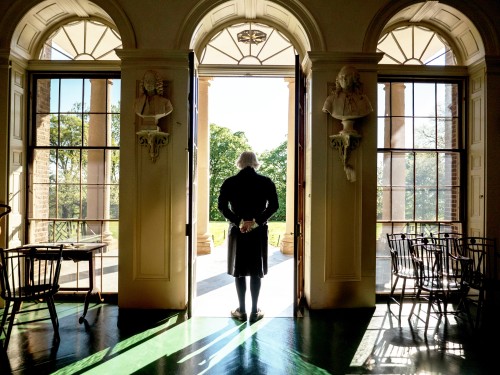Trist, the son of Mary Louisa Brown and Hore Browse Trist, was born in Charlottesville, Virginia, in 1800. In 1803, when President Jefferson offered his father the post of customs collector at Natchez, young Nicholas moved with his family to the Louisiana frontier. Mary Trist, with Nicholas and younger son Browse, remained in Louisiana following Hore Browse Trist's death from yellow fever in 1804.
In 1817, Nicholas Trist graduated from the College of Orleans and accepted an invitation from Thomas Jefferson to visit Monticello. During this visit, he met and fell in love with Virginia Jefferson Randolph, one of Jefferson's granddaughters. In 1818, he left Monticello to continue his education at the United States Military Academy at West Point. Less interested in a military career than one in law, Trist left the academy without graduating and returned to Monticello in June 1821. Once there, he was engaged to Virginia Randolph, then left to rejoin his family in Louisiana. When his mother died unexpectedly in the spring of 1823, Trist returned to Monticello to study law with Jefferson.
On September 11, 1824, Nicholas Trist and Virginia Randolph were married at Monticello. They had three children: Martha Jefferson Trist Burke, Thomas Jefferson Trist, and Hore Browse Trist. In residence at Monticello, Trist served as Thomas Jefferson's private secretary and, after Jefferson's death in 1826, as an executor of his estate.
Nicholas Trist's political career began with a clerkship in the U.S. State Department from 1828-1831, after which he became Andrew Jackson's private secretary. In 1832, he began a second clerkship in the State Department, and then served as consul at Havana, Cuba, in 1833-1841. Trist returned to Washington in 1845 as chief clerk of the State Department.
In the late 1840s, the Polk administration sent Trist to Mexico to negotiate a peace treaty that would end the war with that country. While there in 1848, he defied a presidential recall, an act that put him out of favor with President James K. Polk and essentially ended his political career. After his return home, the Trist family led an unsettled and debt-ridden life. In his final years, Nicholas Trist was postmaster at Alexandria, Virginia. He died in Alexandria on February 11, 1874.
- Heidi Hackford, 2004
ADDRESS:
931 Thomas Jefferson Parkway
Charlottesville, VA 22902
GENERAL INFORMATION:
(434) 984-9800
